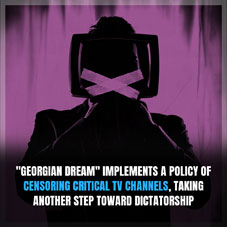
Civil Groups Say Georgian Dream Is Silencing Critical Media
By Liza Mchedlidze
Thursday, June 5, 2025
According to a joint statement from civil society and media organizations, the ruling Georgian Dream party is trying to control the media and limit free speech in Georgia. The statement accuses the party of using state power to censor and punish independent news outlets that criticize the government.
The groups say the ruling party filed official complaints with the Communications Commission against TV Pirveli, Formula, and Mtavari TV, which now operates only online. These complaints focus on banning the use of certain words and phrases like "regime prisoners," "Dream's Ministry of Internal Affairs," and "illegitimate parliament." According to the statement, these are not lies but opinions that should be protected under Georgian law.
The groups claim the Communications Commission is not acting fairly and is under the control of Georgian Dream. They say the complaints are meant to intimidate journalists and pressure them into silence.
In their view, this is happening during a wider political crisis. The statement says the 2024 elections lacked legitimacy and the government has stopped talks with the European Union, despite public support for joining the EU. It also says peaceful protests have been broken up with violence and that many protesters have been arrested, mistreated, or charged unfairly. The statement points to new laws passed in 2024 and 2025 that label NGOs and media as foreign agents and limit their work.
The groups believe these actions are part of a broader plan to crush independent voices. They say journalists are being attacked during protests, smeared in the media, and put under financial pressure. At the same time, media loyal to the government are being supported, while critical outlets are being pushed aside.
They also say the complaints use legal tools not to fix real problems, but to punish the media for speaking out. According to the statement, Georgian Dream officials often refuse to appear on independent channels and then accuse those outlets of being unfair. The groups argue that this is not a true test of balance, but a political tactic.
The statement claims that these actions go against international agreements. It mentions the European Convention on Human Rights, which protects free speech, and United Nations guidance that says the media must be free to question leaders. It also refers to Council of Europe rules that say media regulators must stay politically neutral.
The signatories of the statement are asking the international community to respond. They want foreign governments and organizations to speak out against these actions and monitor the situation. They are also calling for support for journalists in Georgia, including legal and diplomatic help.
The statement ends with a warning that without free media, democracy cannot survive. According to the groups, silencing reporters and controlling news is against both the Georgian Constitution and the country's international promises.
The statement is signed by many groups across the country, including Transparency International Georgia, the Media Development Foundation, the Europe Foundation, Sapari, and dozens of others working in media, human rights, and civil society.

